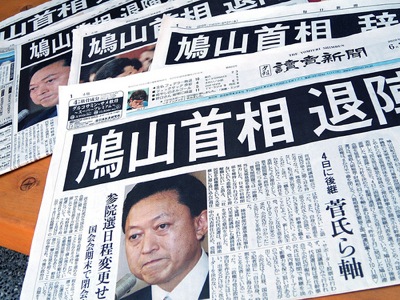Low ratings, however, are symptomatic rather than causal. So what lies behind the low ratings? Are Japanese voters so fickle? Well, yes and no. Japanese voters are for the most reacting to incompetence, to the inability to rule, and to the perception of illegitimacy or corruption. Domestic factors which have played a part include the pension’s scandal which undermined Abe, the lack of an Upper House majority which stymied Fukuda, the lack of a political mandate which finished Aso, and financial impropriety which tainted Hatoyama. However, it is the battle over Japan’s foreign policy and security posture which has had the most interesting role in cutting down all four prime ministers, and upon which this article will focus.
One decisive and divisive issue has been the relationship with the United States and how Japan recalibrates itself in the wake of the Cold War. The great paradox of Japan in the 1980s was that it was an economic giant, but a military pygmy; a first-rate power behaving like a satellite. Japanese policy-makers wanted at once to develop a more independent posture, but without jeopardizing the Alliance itself. As China’s economic rise developed into a military rise, this strategy became more attractive and continued North Korean belligerence sealed the deal. The US response following 9/11 was to urge Japan to take on more global responsibilities and to pull more of its weight in security terms. Therein lay the rub. In grossly simplified terms, the right – namely the Liberal Democratic Party – tried to use this equalisation process to roll back constitutional restrictions in an effort to make Japan ‘a normal country’ in military terms. The left – typically the Democratic Party of Japan, the Social Democratic Party, and others – have resisted both the roll-back and reinterpreted the normalisation process. Normalisation, they insist, should emphasise diplomacy and development, remain tied to the United Nations and avoid US military adventurism.
This battle can be seen in the parliamentary squabbling over the refueling mission, the debate on what Japan should do in Afghanistan, and most recently over the Futenma Base issue. While all of this may make it appear that Japan faces an Alliance problem, in fact the problem is more nuanced with that. Japan faces an identity problem. The United States is at times incidental to the domestic debate, as is the relationship with China. All four prime ministers have attempted to answer the question of whether China is Japan’s greatest economic partner or Japan’s greatest strategic worry. Fukuda and Hatoyama favoured the former approach while Abe and Aso seemed inclined towards the latter.
So how has ‘musical prime ministers’ impacted Japan? How has it impacted the region? Well, firstly, Japan’s ability to function during this chaotic process has been miraculous and largely due to its strong bureaucracy, which has maintained the reins of non-politicised policy-making, while surrendering the reins on sensitive issues. The accusation, by DPJ politicians, that Japan’s mandarins run the nation in way that is reminiscent of Sir Humphrey Appleby from the British sitcom ‘Yes, Minister’ is unfair and dodges responsibility. A case in point was how the DPJ assumed policy control of the Futenma base issue, while having little to do with other aspects of defence policy. Remarkably, the decision by Japan to sign a defence agreement with Australia on June 1st – a small but significant event in Japanese post Cold War history – was carried out by the bureaucracy with little fanfare and little political oversight. The machine can tick over, in other words. But is this how it should be? Should Japanese bureaucrats be given the responsibility for leading their state? Obviously not: civil servants are not risk-takers and ticking over is not decision-making. There are other issues such as mending Japan’s ailing defence industry and writing overall Japanese strategy which only worsen without political leadership.
This weekend marks the beginning of the G20 Summit in South Korea. Japan’s finance minister cannot go. Tension over the Cheonan incident continues to rise. Japan has suddenly gone quiet. It is entirely possible that future historians will one day look at this period as the period that China rose to assume a place at the head table. What will they say of Japan? If Japan is unable to address its identity question, its role in the world, they will merely say that Japan was absent.
John Hemmings is Studies Co-ordinator and a research analyst at the Royal United Services Institute for Defence and Security Studies (RUSI), London.

